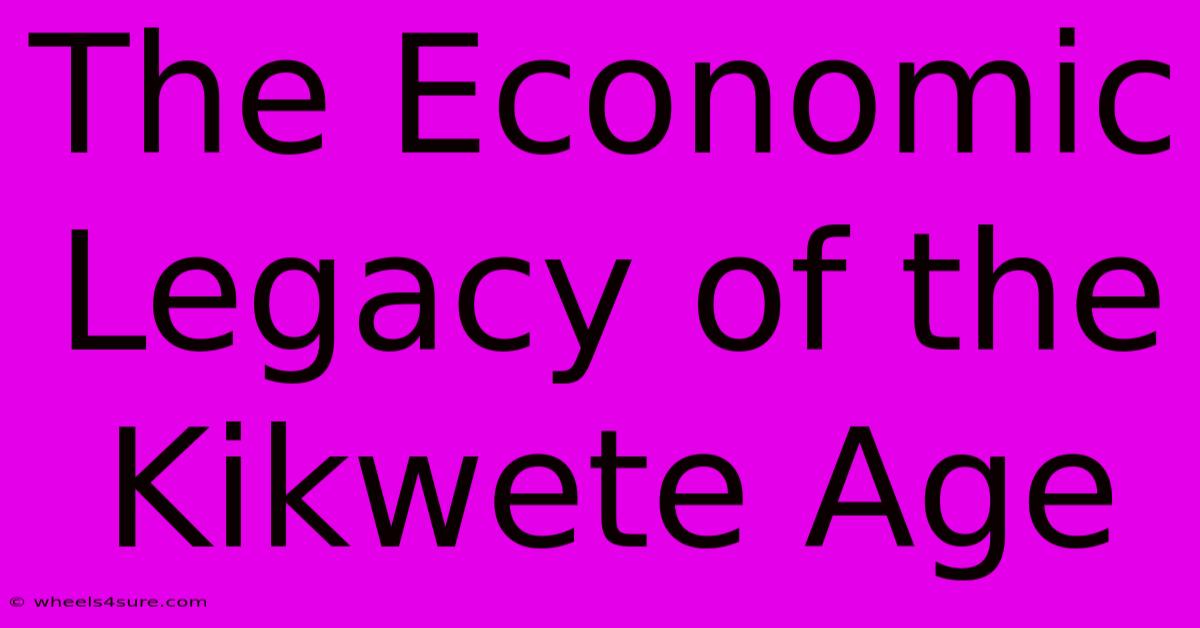The Economic Legacy Of The Kikwete Age

Table of Contents
The Economic Legacy of the Kikwete Age: A Decade of Growth and Challenges
The presidency of Jakaya Kikwete (2005-2015) represents a significant chapter in Tanzania's economic history. His era witnessed considerable progress across several sectors, yet also faced persistent challenges that continue to shape the nation's economic trajectory today. This article delves into the key achievements and shortcomings of the Kikwete administration, analyzing its lasting economic impact on Tanzania.
Economic Growth and Infrastructure Development: A Solid Foundation?
Kikwete's tenure saw a period of sustained economic growth, driven largely by increased investment in infrastructure. Significant strides were made in:
-
Infrastructure: The expansion of transportation networks, including roads, railways, and ports, facilitated trade and economic activity. The construction of new roads and the rehabilitation of existing ones improved connectivity, particularly in rural areas. Similarly, investments in energy infrastructure, though sometimes hampered by delays, aimed to address persistent power shortages that stifled industrial growth.
-
Telecommunications: The expansion of mobile phone networks dramatically improved communication, connecting remote communities and fostering financial inclusion through mobile money platforms like M-Pesa. This revolutionized the way businesses operated and facilitated access to financial services, particularly for the previously unbanked population.
-
Mining Sector Growth: Tanzania's mining sector experienced a boom, attracting significant foreign investment and contributing substantially to GDP growth. The discovery and exploitation of new mineral resources, such as gold and Tanzanite, provided a significant boost to the national economy. However, this growth also brought challenges related to environmental protection and equitable distribution of benefits.
Challenges to sustained Growth
While significant progress was made, the Kikwete era also grappled with critical challenges:
-
Agricultural Productivity: Despite its importance to the economy, agricultural productivity remained relatively low. This limitation hindered efforts to achieve food security and reduce rural poverty. While investments were made in agricultural infrastructure and technology, their impact was insufficient to fully address the sector's underlying challenges.
-
Poverty and Inequality: Despite overall economic growth, poverty and income inequality remained stubbornly high. The benefits of economic progress were not evenly distributed, leading to social disparities and potential instability.
-
Dependence on Foreign Aid: Tanzania's economy remained heavily reliant on foreign aid and grants, limiting its long-term sustainability and independence. While aid played a crucial role in funding development projects, reducing this dependence became a critical long-term objective.
-
Corruption: Corruption continued to be a significant impediment to economic growth and development during the Kikwete presidency. Transparency and accountability remained persistent concerns, affecting the effectiveness of public spending and deterring foreign investment.
The Kikwete Legacy: A Mixed Bag
The economic legacy of the Kikwete era is complex and multifaceted. While substantial progress was made in infrastructure development and economic growth, challenges relating to poverty, inequality, and corruption persisted. His administration’s focus on infrastructure laid a foundation for future development, but the failure to adequately address agricultural productivity and improve the business environment hampered the achievement of more inclusive and sustainable economic growth.
Looking Ahead: Lessons Learned and Future Prospects
The experiences of the Kikwete era offer valuable lessons for Tanzania's future economic development. Addressing the remaining challenges requires a multi-pronged approach focused on:
-
Improving agricultural productivity: Investing in research and technology, promoting sustainable farming practices, and improving access to markets are crucial.
-
Promoting inclusive growth: Targeted programs to reduce poverty and inequality, ensuring that the benefits of economic growth reach the most vulnerable populations, are essential.
-
Strengthening governance and tackling corruption: Improving transparency, accountability, and the rule of law is vital for attracting foreign investment and promoting sustainable economic development.
-
Diversifying the economy: Reducing dependence on specific sectors like mining and enhancing the contribution of manufacturing, tourism, and other sectors to bolster economic resilience.
The Kikwete years provide a backdrop against which to analyze Tanzania's current economic situation and future ambitions. His administration's successes and failures offer a case study in the complexities of balancing economic growth with social development and the enduring need for good governance. Understanding this legacy is crucial to shaping Tanzania's path toward sustainable and equitable prosperity.

Thank you for visiting our website wich cover about The Economic Legacy Of The Kikwete Age. We hope the information provided has been useful to you. Feel free to contact us if you have any questions or need further assistance. See you next time and dont miss to bookmark.
Featured Posts
-
Billy Corgans Dad Wisdom Surprising Life Lessons
Mar 31, 2025
-
Flavio Briatores Net Worth A Surprising Revelation
Mar 31, 2025
-
Salman Khans Son Is He Bollywood Ready
Mar 31, 2025
-
David Beckhams Daughters Creative Spirit
Mar 31, 2025
-
Jay Shahs Net Worth A Surprising Revelation
Mar 31, 2025
